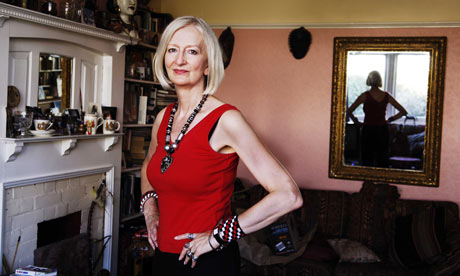Maggie Gee
I recently worked with Dr Sarah Dillon from the University of St Andrews and Anthony Levings, the Managing Editor of the arts and humanities publisher Gylphi, to organise a two-day international conference dedicated to the work of British novelist Maggie Gee. The conference brought scholars together for the first academic event dedicated to Maggie Gee’s writing. We were delighted that Maggie herself attended the conferene and gave readings of My Cleaner and The Flood (YouTube clips forthcoming shortly), as well as answering questions in a public Q&A, and our keynote speakers Professor Susan Alice Fischer (City University of New York) and Dr John Sears (Manchester Metroplitan University) gave outstanding plenaries.
Since she was selected for Granta’s first list of Best of Young British Novelists in 1983 (in company with Salman Rushdie, Kazuo Ishiguro, Martin Amis, Pat Barker, Julian Barnes, Ian McEwan and Rose Tremain), Gee has worked in publishing, academic research (gaining a PhD in the twentieth-century novel from Wolverhampton Polytechnic in 1980) and was the first female Chair of the Royal Society of Literature. She is currently working as one of the Society’s Vice Presidents, as well as acting as Visiting Professor of Writing at Sheffield Hallam University. In addition to her publishing and academic responsibilities, Gee is also highly critically acclaimed: her eighth novel, The White Family (2002), was shortlisted in 2002 for the Orange Prize for Fiction as well as the International IMPAC Dublin Literary Award in 2004.
Gee is one of Britain’s most prolific and critically-acclaimed novelists: the author of 12 novels, as well as collections of short stories, edited anthologies of contemporary writing and, most recently, an autobiography – My Animal Life (Telegram Books, 2010; reviewed here). Her writing is distinguished by ambitious scope and aesthetic innovation, tackling political themes and writing across a broad range of subjects and genres. Intertwining intimate domestic dramas with grand-scale, seismic shifts in cosmic balance, several of Gee’s novels imagine global disaster, apocalyptic futures and environmental catastrophes. Meanwhile, Gee is also concerned with exploring issues of racism, prejudice, cultural difference and class inequalities. Her body of work confronts political attitudes in contemporary Britain through satire, comedy, family saga, thriller and romance.
An edited collection with a foreword by Gee, Maggie Gee: Critical Essays, is already contracted to be published as part of Gylphi’s Contemporary Writers: Critical Essays series (Series Editor: Dr Sarah Dillon). If you'd like any further information, please see the conference blog, or visit the facebook page.
You can view the Prezi slides from my own paper, "Discarding the Nets of History: Pastoral Post-Apocalypticism in Maggie Gee's The Flood."







 Dr Caroline Edwards is Senior Lecturer in Modern & Contemporary Literature at Birkbeck, University of London. Her research and teaching specialisms are in 21st century literature and critical theory, science fiction and post-apocalyptic narratives, Marxist aesthetics, and utopianism.
Dr Caroline Edwards is Senior Lecturer in Modern & Contemporary Literature at Birkbeck, University of London. Her research and teaching specialisms are in 21st century literature and critical theory, science fiction and post-apocalyptic narratives, Marxist aesthetics, and utopianism.
Follow / Contact